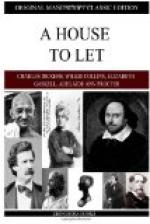Therefore, I thought it just as well, before any London Philandering took place, that I should have a little time to look round me, and to see what girls were in and about the place. So, nobody stayed with me in my new lodging at first after Trottle had established me there safe and sound, but Peggy Flobbins, my maid; a most affectionate and attached woman, who never was an object of Philandering since I have known her, and is not likely to begin to become so after nine-and-twenty years next March.
It was the fifth of November when I first breakfasted in my new rooms. The Guys were going about in the brown fog, like magnified monsters of insects in table-beer, and there was a Guy resting on the door-steps of the House to Let. I put on my glasses, partly to see how the boys were pleased with what I sent them out by Peggy, and partly to make sure that she didn’t approach too near the ridiculous object, which of course was full of sky-rockets, and might go off into bangs at any moment. In this way it happened that the first time I ever looked at the House to Let, after I became its opposite neighbour, I had my glasses on. And this might not have happened once in fifty times, for my sight is uncommonly good for my time of life; and I wear glasses as little as I can, for fear of spoiling it.
I knew already that it was a ten-roomed house, very dirty, and much dilapidated; that the area-rails were rusty and peeling away, and that two or three of them were wanting, or half-wanting; that there were broken panes of glass in the windows, and blotches of mud on other panes, which the boys had thrown at them; that there was quite a collection of stones in the area, also proceeding from those Young Mischiefs; that there were games chalked on the pavement before the house, and likenesses of ghosts chalked on the street-door; that the windows were all darkened by rotting old blinds, or shutters, or both; that the bills “To Let,” had curled up, as if the damp air of the place had given them cramps; or had dropped down into corners, as if they were no more. I had seen all this on my first visit, and I had remarked to Trottle, that the lower part of the black board about terms was split away; that the rest had become illegible, and that the very stone of the door-steps was broken across. Notwithstanding, I sat at my breakfast table on that Please to Remember the fifth of November morning, staring at the House through my glasses, as if I had never looked at it before.
All at once—in the first-floor window on my right—down in a low corner, at a hole in a blind or a shutter—I found that I was looking at a secret Eye. The reflection of my fire may have touched it and made it shine; but, I saw it shine and vanish.




